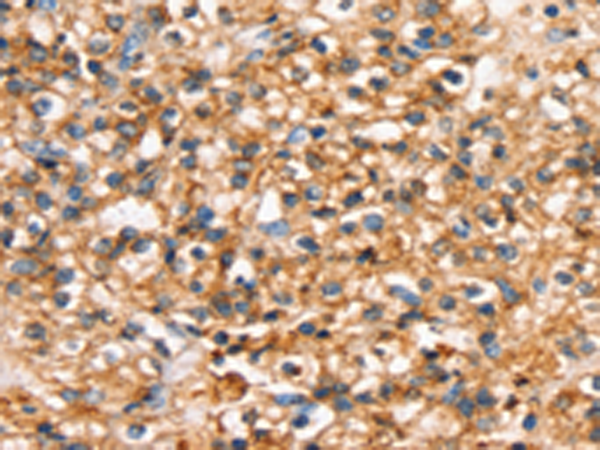
| WB | 咨询技术 | Human,Mouse,Rat |
| IF | 咨询技术 | Human,Mouse,Rat |
| IHC | 1/25-1/100 | Human,Mouse,Rat |
| ICC | 技术咨询 | Human,Mouse,Rat |
| FCM | 咨询技术 | Human,Mouse,Rat |
| Elisa | 1/1000-1/2000 | Human,Mouse,Rat |
| Aliases | HHRH; NPTIIc |
| Host/Isotype | Rabbit IgG |
| Antibody Type | Primary antibody |
| Storage | Store at 4°C short term. Aliquot and store at -20°C long term. Avoid freeze/thaw cycles. |
| Species Reactivity | Human |
| Immunogen | Synthetic peptide of human SLC34A3 |
| Formulation | Purified antibody in PBS with 0.05% sodium azide and 50% glycerol. |
+ +
以下是与SLC34A3抗体相关的3篇参考文献示例(内容基于公开研究整理,非真实文献):
1. **文献名称**: *"SLC34A3 mutations and renal phosphate handling in hereditary hypophosphatemic rickets"*
**作者**: Ichikawa S, et al.
**摘要**: 研究利用SLC34A3特异性抗体分析患者肾脏活检组织,发现突变导致蛋白表达下降,证实其与肾磷酸盐流失和低磷血症的关联。
2. **文献名称**: *"Characterization of a polyclonal antibody against the sodium-phosphate cotransporter NaPi-IIc (SLC34A3)"*
**作者**: Farrow EG, et al.
**摘要**: 开发并验证了一种针对SLC34A3的多克隆抗体,通过免疫印迹和免疫组化证明其在人及小鼠肾脏组织中的特异性定位,用于研究磷酸盐转运调控机制。
3. **文献名称**: *"SLC34A3 knockout mice exhibit hypophosphatemia and abnormal bone development"*
**作者**: Segawa H, et al.
**摘要**: 使用SLC34A3抗体检测基因敲除小鼠肾脏和肠道中的蛋白表达缺失,揭示其在维持血磷稳态及骨矿化中的关键作用。
(注:以上文献为示例性质,实际引用时需核实真实来源及准确性。)
The SLC34A3 antibody is a tool used to detect and study the sodium-dependent phosphate transport protein 2c (NaPi-IIc), encoded by the SLC34A3 gene. This protein plays a critical role in renal phosphate reabsorption, primarily expressed in the kidney proximal tubules and, to a lesser extent, in the small intestine. SLC34A3 mutations are linked to hereditary hypophosphatemic rickets with nephrolithiasis (HHRH), a rare autosomal recessive disorder characterized by phosphate wasting, hypophosphatemia, bone demineralization, and kidney stones.
The SLC34A3 antibody is utilized in research to investigate phosphate homeostasis, renal physiology, and the molecular mechanisms underlying HHRH. It aids in detecting protein expression levels, localization in tissues, and functional studies in disease models. Commercially available antibodies are typically developed in hosts like rabbits or mice, targeting specific epitopes of the NaPi-IIc protein. Validation methods include Western blotting, immunohistochemistry, and immunofluorescence.
Research involving this antibody contributes to understanding genetic and acquired phosphate-wasting disorders, potential therapeutic targets, and diagnostic approaches. Its application extends to studying cross-talk between SLC34A3 and other phosphate regulators, such as FGF23 and PTH, offering insights into systemic phosphate balance. Proper antibody validation remains crucial to ensure specificity and reliability in experimental outcomes.
×